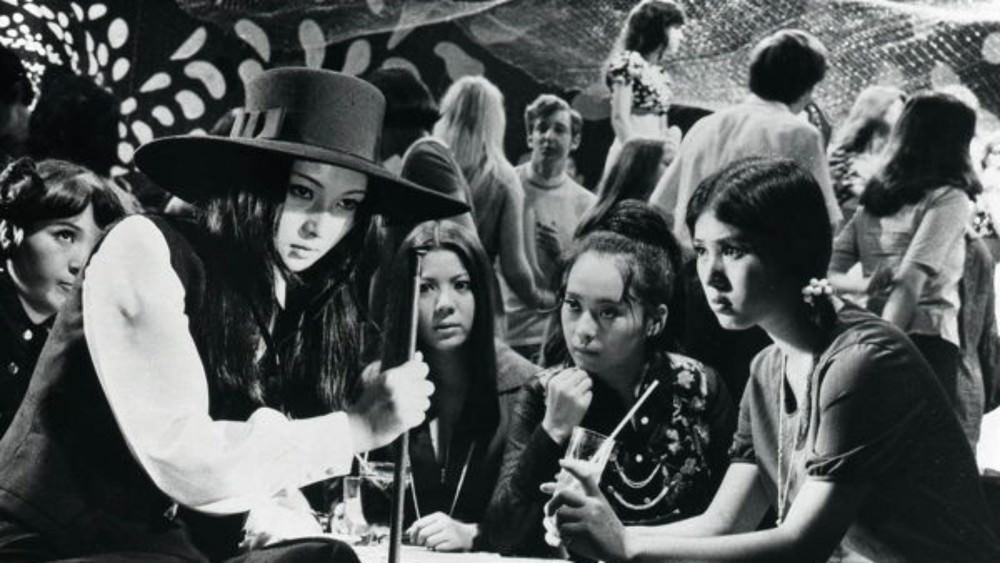Stray Cat Rock: Sex Hunter


Japan
Stray Cat Rock: Sex Hunter is the third of five films in the Stray Cat Rock or Alley Cat Rock series. Released in September 1970, it followed the release of Stray Cat Rock: Delinquent Girl Boss (May 1970) and Stray Cat Rock: Wild Jumbo (August 1970), and preceded Stray Cat Rock: Machine Animal (November 1970) and Stray Cat Rock: Beat ’71 (January 1971). The franchise was produced by Nikkatsu and foregrounds that studio’s shift toward the production of “roman porno” films from 1971 with Afternoon Wife: Affair in the Afternoon alongside Toei studio’s “Pinky Violence” films (Mes 2004). Sex Hunter lacks the regular inclusion of soft-core pornographic sequences that would define the roman porno films, but nonetheless exploits the appeal of sexually transgressive young women. Though referred to as sequels, the films’ narratives do not follow on from one another, and the likeness extends from the name to the repeated use of directors (Yasuharu Hasebe in Delinquent Girl Boss, Sex Hunter, Machine Animal) and actors (Meiko Kaji in Delinquent Girl Boss, Wild Jumbo, Sex Hunter, Machine Animal) employed on studio contracts. But the Stray Cat Rock films are centrally defined by the focus on delinquent girl gangs performing a version of early 1970s cool that emphasised sex, fashion, petty crime, recreational drugs, and psychedelic rock performed in action sequences featuring dance clubs and go-go dancing, jeeps, martial arts, and warring gangs. In the short life of the popular series and its clear youth exploitation, there are obvious similarities with the taiyōzoku films of the 1950s.
Stray Cat Rock: Sex Hunter is the best known film of the franchise and draws on Japan’s U.S. Occupation history to establish its drama. The central tension exists between the all-girl gang the Alleycats, led by Mako (Meiko Kaji), and the all-guy gang the Eagles, led by the Baron (Tatsuya Fuji of Black Sun [1964], In the Realm of the Senses [1976], and four of the Stray Cat Rock films). Formerly civil relations between the gangs sour when Maki of the Alleycats rebuffs the Eagle Susumu, in favour of another love interest, Ichiro. Ichiro is mixed-race, as is Kazuma, who appears in town in search of his lost sister. Mako falls for Kazuma, as Baron pursues a war against all “hāfu” – Japanese of mix-raced heritage but specifically the children of Japanese women and African-American occupation soldiers – who he alleges are stealing Japanese women. Baron’s hatred is driven by the former rape of his sister by an American soldier and is also inferred to be associated with his impotence. In the Alleycats’ attempt to protect Kazuma and others from the Eagles’ mission to wipe-out local hāfu, Stray Cat Rock: Sex Hunter engages the controversial issues of Occupation sexual relationships and ethnic minorities, which had otherwise been left to Japanese new wave films such as Black Snow (1965, directed by Tetsuji Takechi). This theme is also referenced in the appearance of “Golden Half” in a nightclub scene, a popular all-girl J-pop group from 1970-1974 whose mixed-race members would regularly sing Western pop songs in Japanese. – Liam Grealy
Further reading:
– Mes, T. (2004). Stray Cat Rock: Sex Hunter. Midnight Eye. http://www.midnighteye.com/reviews/stray-cat-rock-sex-hunter/
– Sharp, J. (2011). Historical dictionary of Japanese cinema. The Scarecrow Press, Inc., Lanham: Toronto & Plymouth.